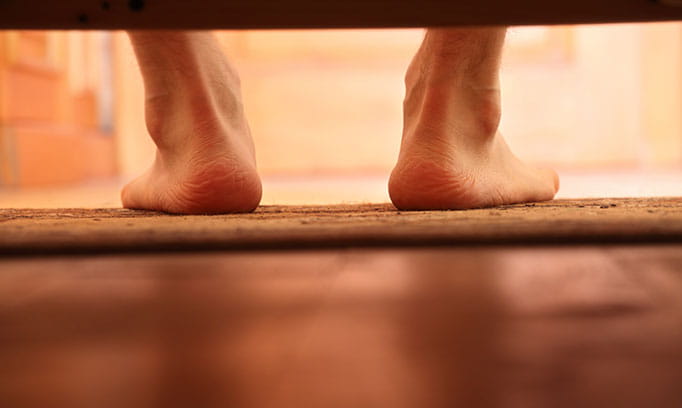How To Listen with Your Feet

One cold winter day, the Tzadik of Yerushalaim, Rabbi Aryeh Levin was walking outside when he noticed the boys from his Yeshiva playing outside. Towards the end of the game, they ran over to a caretaker, each one buying a cup of hot tea. All but one boy.
Reb Aryeh walked over to the boy, and asked why he wasn’t getting a tea. “Rebbi,” he exclaimed loudly, “I hate tea!”
Reb Aryeh nodded his head slowly and smiled. He walked over to the caretaker, and taking a few coins out of his pocket, he instructed the caretaker to bring a cup over the boy, who, to the amazement of the caretaker, drank it immediately.
The bewildered caretaker turned to Reb Aryeh “The boy said he hated tea.”
“Yes, he did say that” said the Rabbi. “But if only you would have heard him, you would have known that he was really saying “I’m cold and I’m thirsty and I have no money to buy tea. And I’m too embarrassed to ask my friends. So I’ll say that I hate tea instead.””
“My dear friend,” Reb Ayreh continued, “You cannot just listen with your ears...״
The Torah tells us this Shabbos that listening begins with the ears, but doesn't end there:
וְהָיָה עֵקֶב תִּשְׁמְעוּן... (Literally) If your heels will listen
Of course, the common translation of this phrase is that “as a result of listening, Hashem will bless you”... But the simple reading of the Pasuk is telling us something quite different: If “our heels would listen”, then Hashem will shower us with bracha.
Reb Shalom Ber of Lubavitch once told a story explaining this literal translation (A Treasury of Chassidic Tales pg. 498):
“When Reb Menachem Mendel of Lubavitch – later to become the Tzemach Tzedek – was a little boy his grandfather, The Alter Rebbe, examined him on the Chumash which he had recently begun to study. They came to the pasuk עקב אשר שמע אברהם בקולי 'Because (eikev) Avraham listened to My voice.'
Asked to explain it, the child said; “Avraham heard God's command even with his “eikev,” his heel!' [As if to say: So utterly permeated was his whole body with an awareness of the divine spark that animated it, that with his very eikev (heel) Avraham listened to My voice'!]
The grandfather, Reb Shneur Zalman of Liadi, was more than pleased with this answer, and said: 'In fact we find this very command in another verse – וְהָיָה עֵקֶב תִּשְׁמְעוּן (literally: 'And it shall come to pass that if you listen, then as a result ... '. This verse tells us that we should strive to attain a level at which our hells should listen – that even our heel should hear God's command and hasten to fulfill it!'”
Listening is not simply a process by which we absorb information. It's a process of being transformed by the information we encounter.
The need to listen with our whole selves is the goal of Talmud Torah. But it's also essential when listening to each other, and it's just as important when listening to our own needs.
When I started running, the best advice I received was to “listen to my body”. I was told “Pay close attention to how you feel, when you feel differently and analyze the actions and habits that preceded this feeling.” I've been working on doing so ever since. But itequires constant consciousness, questioning how I'm feeling and what it is that made me feel that way.
In every area of life, we ignore the subtleties of the messages around us at our own peril. So much illness, pain and injury could be avoided by listening to the quiet early warning signs in our bodies, families and careers.
But even when we are listening carefully, these critical and soft sounds are not easily heard over the noise echoing in the world around us. So the Yetzer Hara convinces us to focus only on that which is loudest and largest, ignoring the small details that might hold the keys to our future success and happiness.
How can we possibly contend with it?
Practically speaking, there are two ways to ensure that we get better at listening. We can either strain our ears to hear over the noise, or perhaps, a better way is simply to turn down the volume, or move to a quieter spot.
There was a moment in the middle of COVID that someone approached me looking for some assistance on how to deal with his growing anxiety. I asked him what the problem was, to which he explained all of his concerns about the State of the Union and the future of the USA. He confided that it was becoming clear to him that the political damage of COVID would irrevocably lead the world to to a path of violence and starvation. With all of this, he was struggling to sleep at night.
I asked him how his kids were doing. Were they healthy? Were they making it through zoom-school ok? How was his marriage? What about his parnassah?
To all of this, he told me that it was going well. In some cases, even better than before.
“This sounds amazing” I said. “Baruch Hashem you guys are doing so well. I don't understand what the problem is.”
He repeated his concerns about the world and the future of humanity. At this point I asked him simply what might happen if he deleted his news apps and stopped doom-scrolling through social media. He chuckled nervously and agreed, “Rabbi, I think most of these problems would go away...”
Hashem should help us to get better at listening. But at the very least, He should bless us to turn down the noise.